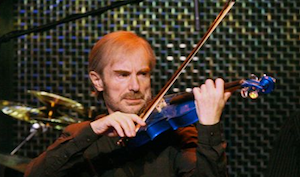
Q&A: Jean-Luc Ponty
I have started a new daily routine in my office by blindly selecting a CD from the over filled shelves to listen to throughout the day. Yesterday, I selected a 2-CD set from violinist Jean-Luc Ponty titled Le Voyage-The Jean-Luc Ponty Anthology which was issued by Rhino. While listening to Jean-Luc’s classic fusion works from 1975-1993, I found myself marveling at just how pioneering he was on his violin both acoustically and electronically. The three tracks that I remembered hearing during much of my youth and really had to crank up were “Renaissance,” “New Country” and “Mirage.” Those tunes, for me, capture the essence and musical spirit of the classic Jean-Luc vibe that was so popular and appealing back in the day. The music still works and holds up well. A real testament to Jean-Luc Ponty’s creativity and artistry for sure. A few years ago, I interviewed Jean-Luc and asked him about his influences, roots in jazz and beyond.
How or when did you first discover jazz?
I was studying classical violin at the Conservatory in Paris in 1958 and one of the students had two jazz albums which I borrowed. None of the students played jazz but a few liked to listen to it. One album was by the Modern Jazz Quartet and the other was Chet Baker with strings. I still remember. It was a smooth introduction to jazz for classical musicians and it worked like a magic spell on me.
Do you remember the first recording you ever purchased (jazz or otherwise)?
I purchased my first record player right before I discovered jazz in the 50s. It looked like a small cardboard suitcase, there was one speaker located in the cover which you could remove. It was in mono of course and sounded like …..nothing we hear today, thank God. With it came a small vinyl of A Little Night Music by Mozart. I purchased some classical concertos that I was studying and I believe my first jazz record was the Benny Goodman Trio.
Name one of your greatest creative influences and why?
That’s an impossible question for me because I had so many diverse influences. My jazz phrasing was directly inspired by several of the great bebop masters especially Clifford Brown and Miles because the range of the trumpet is close to that of a violin. But I also listened to Cannonball Adderley, Sonny Rollins, Coltrane and some pianists as well. This was a period of learning how to adapt a general concept of music to my instrument. It was so new to me, and it was just being created as well. I feel I became creative the day I decided to make something personal out of all the early influences I received from classical composers and jazz innovators.
You have said that although you donˇt categorize your music, you have a strong affinity for jazz. Please elaborate.
After graduating from the Conservatory, I was hired by a symphony orchestra but at the same time I started performing in jazz clubs in Paris, such as the Blue Note. I eventually left the symphony to play jazz exclusively and spent about 10 years playing first with be-bop bands, then hard-bop, then avant-garde or free-form, before I connected with progressive rock bands in the late 60s. So, although jazz is not the only element in the music I have produced for many years now, I have strong roots in that idiom.
Name one jazz recording that you cannot live without.
Bill Evans at the Village Vanguard
What is the best thing about playing jazz?
It has to be the passion for it….since you make less money than with pop music…..Seriously, it gives the player a chance to create his/her unique voice in music and it stimulates the intelligence of both performers and listeners alike.
Recommended:
Le Voyage-The Jean-Luc Ponty Anthology
Links:
Jean-Luc Ponty
Photo credit: Steve Ritter